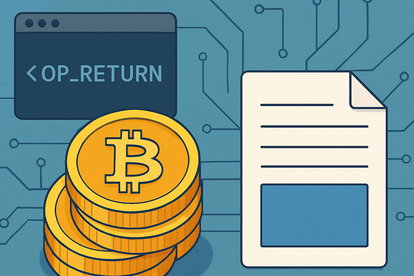The upcoming Bitcoin update will expand the data limit for the OP_RETURN function to 4 megabytes, according to Bitcoin Core developer Gloria Zhao. The change will take effect on October 30 and is part of Bitcoin Core 30.
The new data size replaces the previous 80-byte restriction on OP_RETURN. It allows users to store large files directly on the Bitcoin blockchain, including text, images, audio, or documents.
The change follows approval of merged pull request #32406, signed by 31 Bitcoin Core developers on May 5. Zhao confirmed the update in a GitHub post dated June 10. This development has renewed debate over how the Bitcoin blockchain should be used.
OP_RETURN Change Sparks Reaction from Bitcoin Community
Several public figures in the Bitcoin community responded to the OP_RETURN limit expansion.
Some expressed concern that adding large files to the Bitcoin blockchain may increase data load and shift focus away from peer-to-peer transactions.
Alexander Lin, co-founder of Reforge, called the decision a “terrible mistake.” On X, he wrote that the move “increases systemic risk to BTC’s core property as sound money.”
Dennis Porter, CEO of Satoshi Action Fund, also criticized the Bitcoin update. He said,
“I’ve helped raise over $200,000 for core devs during my time in Bitcoin. My faith in their work is now broken.”
He added that he will stop supporting Bitcoin Core development.
Jason Hughes, vice president at Ocean Mining, said in a post that he may step back from the discussion.
“Personally, I’m out of energy on this fight,”
he wrote.
These responses reflect a broader disagreement over whether Bitcoin Core should allow the Bitcoin blockchain to be used for non-financial purposes.
Bitcoin Core Developers Say It’s Not Their Role to Restrict Use
Bitcoin Core developer Gloria Zhao responded to the criticism in the GitHub thread. She wrote that Bitcoin Core should not decide which transactions are valid based on content.
“Demanding that Bitcoin Core prevent certain transactions from being mined reflects a misunderstanding of the relationship between open source software users and developers,”
Zhao said.
The lead author of merged pull request #32406, Peter Todd, also supported the update. He has publicly argued that increasing the data limit allows broader use cases for the Bitcoin blockchain.
He maintained that software changes should leave decisions to users and miners, not developers.
The OP_RETURN function gained attention during the 2023 Ordinals trend, when users stored files such as images, documents, and audio directly on-chain.
Bitcoin Core Market Share Falls After Merged Pull Request #32406
Since the proposal to raise the OP_RETURN data cap was introduced on April 28, Bitcoin Core’s market share has dropped from around 98% to slightly over 88%.
This shift appears to benefit the Bitcoin Knots client, which now holds 11.48% of the total Bitcoin node market share, according to coin.dance.
Commentator Matthew R. Kratter noted that the decision could reduce Bitcoin Core’s share further. He suggested it could fall to 20–30% in the next one to three years if the current trend continues.
The increase in Bitcoin Knots usage indicates that some Bitcoin node operators are switching software in response to the new Bitcoin update.
Background on OP_RETURN and Its Use in Bitcoin
The OP_RETURN function allows users to write data directly onto the Bitcoin blockchain. Initially capped at 80 bytes, the feature was limited to prevent bloating the chain with unrelated content.
Despite the limit, users found ways to use OP_RETURN creatively. In 2023, the Ordinals protocol let users inscribe files such as NFT-style images and historical documents onto Bitcoin. This included the Afghan war logs from WikiLeaks.
These actions divided the Bitcoin community. Some considered it spam, while others viewed it as a valid use of blockchain space. With the new Bitcoin update, file sizes may increase dramatically—up to 4MB per transaction output.
The update does not guarantee that all miners will include these transactions. It only allows the software to accept them. Final decisions will depend on miner policies, transaction fees, and network conditions.
Disclosure:This article does not contain investment advice or recommendations. Every investment and trading move involves risk, and readers should conduct their own research when making a decision.
Kriptoworld.com accepts no liability for any errors in the articles or for any financial loss resulting from incorrect information.


